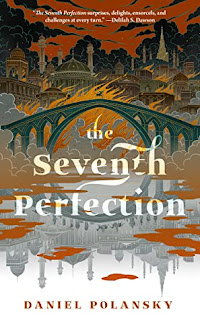5/5 stars on Goodreads
 |
| The Seventh Perfection by Daniel Polansky |
Daniel Polansky’s books have been a hit and miss for me over the years, and after Those Below I decided I’d approach his works with great caution. Imagine my surprise, then, when I found myself requesting his upcoming book, The Seventh Perfection, from NetGalley. And since I was granted an early copy, I actually had to read it too.
I’m glad I did.
The Seventh Perfection is fantasy written in a style that I’ve only ever encountered in short stories before. Then again, the book almost falls into that category at only 160 pages, and I was able to read it in one sitting. The narrative consists solely of conversations the main character has with an array of people, but with a twist: her side of them has been removed completely. The reader is perfectly able to infer that she’s there from how the people talking to her refer to her presence. They comment on her questions, refer to something she does or says, or describe her looks or mood. And the whole time she remains silent.
I feared it would be difficult to get the hang of the story, but already by second page I was perfectly able to follow what was going on. It takes a while before there is enough information about the main character to form a picture of her—if I hadn’t read the back copy I wouldn’t even have known she’s a woman—but all in all, the story was easy to follow.
Manet is seeking to unravel a mystery of a woman whose picture she has been sent in a locket by an anonymous person. Why her identity compels her isn’t made clear, and for the first half of the book I assumed she was on an official government business, as she is constantly referred to by her title amanuensis. Little by little, it becomes clear that she’s on a personal mission, that the woman’s identity matters to her, and that the God-King she serves isn’t happy about it. Mostly, because along the way, she learns the truth about how the God-King came to ascend in the first place.
The book is set in a world that is a mixture of fantasy and technology, but it’s only ever hinted at. There are no descriptions of surroundings—or people, for that matter. For some reason I kept imagining the town of Polansky’s Empty Throne duology, which worked fine, even though the towns aren’t all that similar. There are beings other than human that Manet encounters during her quest, and towards the end the interviews aren’t even with humans anymore. So, despite the lack of descriptions, the world emerges as rich and complex.
We learn a surprisingly lot about Manet, despite the fact that only the second to last chapter gives her voice. She emerges as a rather unlikeable person—she manages to anger almost everyone she encounters, her friends included—but extremely determined. There is nothing she wouldn’t do to learn the truth. She is one of the few people who have learned the art of seven perfections, a discipline of body and mind, the seventh of which is a perfect memory. While this was interesting, the narrative style that erases her from the picture made her special skills go unused and unnoticed. It’s therefore slightly unnecessary that she is such a unique person. She could’ve been anyone, really.
The Seventh Perfection is an excellent book. It gets four stars for the story and the world, and an extra star for pulling off the chosen style with such skill. If you’re looking for a quick and surprisingly immersive read, I warmly recommend this one.
No comments:
Post a Comment